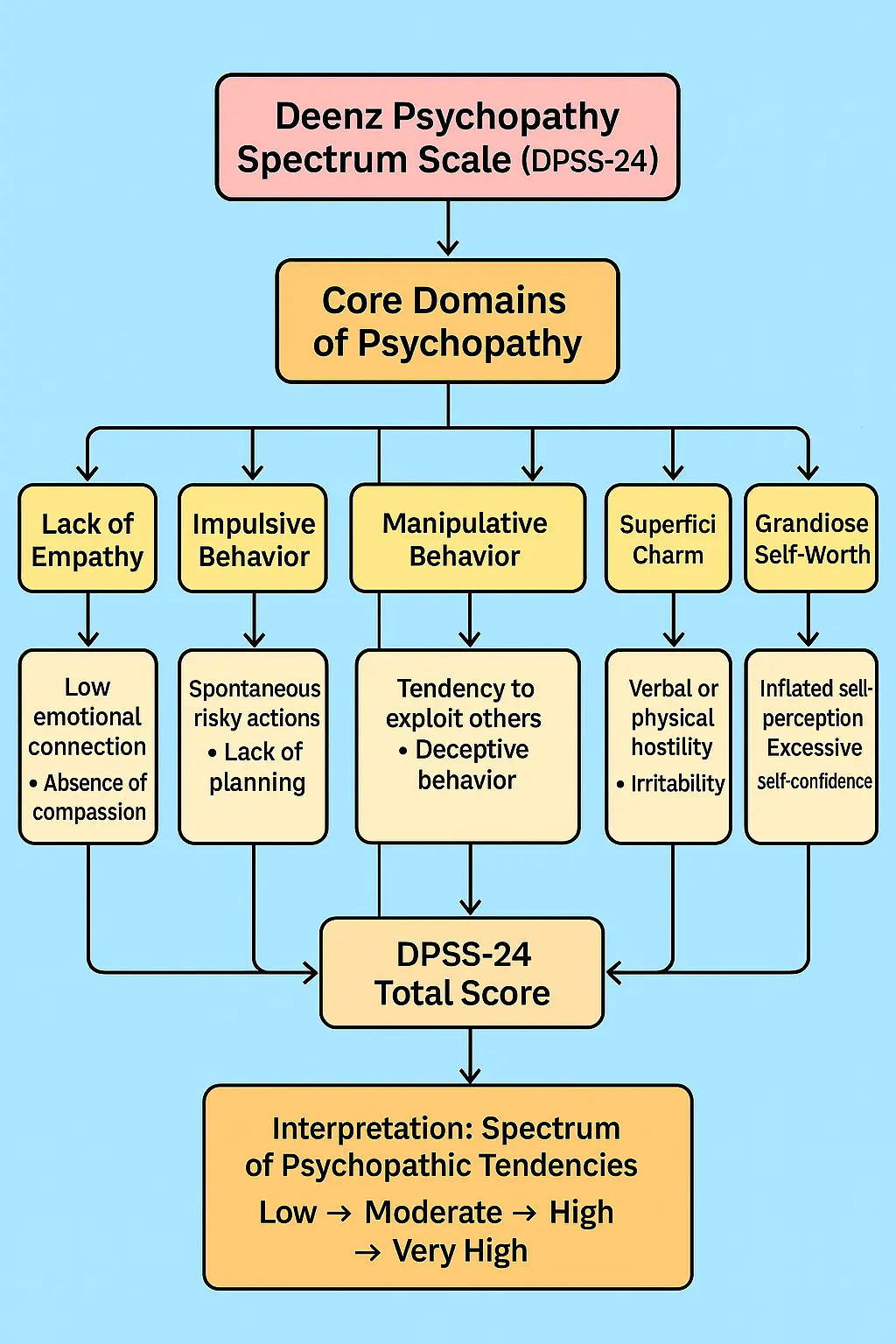Psychopath test is an interactive version of Deenz Psychopathy Spectrum Scale (DPSS-24) [1] which is a valid and reliable measure of subclinical traits associated with psychopathy. This psychopath quiz is intended for educational purposes only. Participation in this quiz is completely anonymous and we do not store your results or personal information for research purposes.
The term psychopathy has been derived from the Greek words “psyche” which means mind and “pathos” meaning suffering. In the past, psychopathy was described as the suffering of the mind. Over time the understanding of psychopathy has changed and in the modern psychology, it is considered as a personality disorder characterized by exhibiting antisocial and harmful behaviors.
In contemporary psychology, the term ‘psychopathy’ is often used interchangeably with ‘antisocial personality disorder’ (ASPD). [2] Researchers suggest that psychopathy and antisocial personality do not share the same traits and it is not necessary that every psychopath may have antisocial personality disorder.[3] Psychopathy is multifaceted so understanding the traits on spectrum has proven to be beneficial for research and measuring tendencies towards clinical traits.
The purpose of Deenz Psychopathy Spectrum Scale (DPSS-24) is to measure the subclinical traits, including lack of empathy, impulsivity, manipulative behaviors, etc. Subclinical traits of psychopathy are considered to be below the threshold of traits that may indicate a clinical diagnosis. [4]

Facets of Psychopathy
Lack of empathy (callousness)
Individuals who exhibit lack of empathy often have difficulty understanding others’ feelings, emotions, and experiences also known as callousness. If you score highly in this trait and low in other traits, it does not mean you are less empathic than others. Lack of empathy is often associated with antisocial personality, disorder and narcissistic personality disorder. [5] You can also take the empath test which is based on a case study, measuring empathy among college students.
Impulsive behavior (Capricious)
If a person acts without thinking about consequences of actions, it may be referred to as an “impulsive person.” Impulsiveness is the common trait associated with psychopathy, but if you scored high on this trait and low on other traits, then it may be considered normal. Being capricious does not mean you might have some type of problem, it may be a normal responsive to a situation. Some other personality disorders, in which Capricious is considered major trait are borderline personality disorder, antisocial personality disorder, and attention-deficit/hyperactivity disorder.
Manipulative behavior (Deceptive)
Being deceptive means the person is using manipulative and tactics to control or influence others in a cunning or deceptive way. If you scored high on this scale and low on other traits, it may be a sign of other personality disorders such as narcissism and borderline personality.
Superficial charm (Glibness)
Suppose you do have genuine intentions to appear charming, confident, and likable, and you often use this for personal gain and manipulation. In that case, you will be referred to as a “superficial charm person”. Psychopaths often use this to gain attention and deception.
Aggressive behavior (Aggression)
If you always engage in dangerous or violent behavior because it makes you feel better, then you will be referred to as an aggressive person, but most of the time aggression is considered a hallmark trait of psychopathy. [6]
Sense of self-worth (self-esteem)
Feeling superior to others may be good, but if you find yourself criticizing and belittling others and perceiving them as inferior, it may be indicative of a psychopathic trait. You may be referred to as an “egoistic” person. However, if you scored high on this trait and low on others, then it may be a normal part of your personality and it may be a normal part of healthy self-esteem and confidence.
Disclaimer: Online quizzes and tests including this Psychopathy quiz is not considered accurate. This self-screening tool is based on a valid and reliable scale, however this quiz is intended for educational purposes only. There are various factors that influence the accuracy of the self-assessment. This interactive version is provided as a self-assessment quiz, and the results provided are used for entertainment purposes.
References
- Dar, Deen Mohd, Development and Validation of the Deenz Psychopathy Spectrum Scale (DPSS-24): A Measure of Subclinical Psychopathic Traits (November 14, 2023). http://dx.doi.org/10.2139/ssrn.4749504 ↩
- Ogloff, R. P. (2006). Psychopathy/Antisocial Personality Disorder Conundrum. https://doi.org/10.1080/j.1440-1614.2006.01834.x ↩
- Abdalla-Filho, E., & Völlm, B. (2020). Does every psychopath have an antisocial personality disorder?. https://doi.org/10.1590/1516-4446-2019-0762 ↩
- Falkenbach “The exploration of subclinical psychopathic subtypes and the relationship with types of aggression.” https://doi.org/10.1016/j.paid.2007.10.012 ↩
- Deen Mohd Dar. Deenz Dark Triad Personality Scale: Development, Validation, and Reliability [https://doi.org/10.21203/rs.3.rs-3565477/v2] ↩
- Crawley, “Implusive-Aggression, Antisocial Behaviour and Subclinical Psychopathy” https://doi.org/10.1375/pplt.13.2.232 ↩ ↩